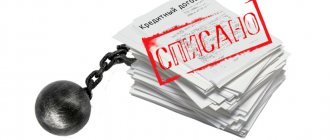Any microfinance company is a business. Despite the fact that the activities of such a lender are regulated by law, each organization organizes its work according to its own scheme. This also applies to debt collection from persistent defaulters. One of the most common tools for “knocking out” debt has been and remains the sale of debt to collection agencies. Such structures help creditors collect borrowed funds from debtors. The second popular tool used by MFOs is to delegate debt collection to the same collectors. This option is more loyal. Employees of such collection agencies act on behalf of the creditor on the basis of the law. So, today the topic of our conversation is microloans and debt collectors.
How I started taking loans
My friends and classmates took out credit cards in their final years. Yes, there are banks that give credit cards to students. Then I laughed at such acquaintances, because I never had the need to get into debt. I was born in St. Petersburg, so I didn’t rent a place, and a scholarship and the earnings of a waiter at the Coffee House were enough for student entertainment.
If there was still not enough, my parents supplied it. What can I say, I was even skeptical about mortgages. In all seriousness, I said that I would rather save money and buy an apartment with my own. This is how I thought until 2014.
Everything changed in 2020. I got a job as a junior software tester in a St. Petersburg office, and I finally got a small but stable salary, about 30 thousand rubles. I continued to live with my parents, but met a girl. I started spending money on it, and my own needs grew.
Either you want a new phone or jeans. And then I got a Tinkoff Bank credit card. I reasoned like this: I will use the card as a lifesaver in case my own money is not enough, and I will report from my salary in such a way as not to leave grace. It worked for the first two months, but then all hell broke loose.
List of collection agencies and which microfinance organizations they work with
The largest and most famous collectors in Russia FASP One of the first collection agencies in Russia was created by FASP CJSC, which continues to operate to this day. KA has more than 110 offices in different regions of the Russian Federation and Kazakhstan, has its own contact centers in Omsk, Voronezh and Almaty, and the training of qualified personnel is provided by its own school of professional collectors. FASP's clients include Sberbank of Russia, VTB-24, OTP Bank, UniCredit Bank, Home Credit Bank, Tinkoff, Oriflame, Sovcombank, MFO Home Money and MigCredit, Vdolg.ru service, etc. FASP almost always operates according to the same scenario. If the debtor lives at a long distance from the nearest office, then the maximum that awaits him is daily calls and monthly letters demanding repayment of the debt within 3 days from the date of receipt.
How do debt collectors carry out collections? According to statistics, most collection agencies convince almost every third borrower to repay the microloan debt. In practice, collectors often use “gangster” techniques in order to collect borrowed funds:
- Intimidation. Company employees send messages and threaten negligent borrowers by phone, who eventually find the required amount to pay off the debt.
- Severe psychological pressure, thanks to which in most cases borrowers begin to repay the resulting debt.
- Threats against the debtor, as well as his family and immediate relatives.
- In rare cases, physical violence.
Naturally, the activities of collection services are strictly regulated by law and, in accordance with this, their employees do not have the right to violate human freedom.
How to get into debt
Two months later, the office began to delay wages. Accordingly, I began to live on funds from my credit card, and covered the payments by first withdrawing money from it. The arrears had not yet appeared, but the monthly payment was growing, the amount of available funds was decreasing, and I had to forget about grace.
After some time, they began to issue wages again, but I lost money on my credit card. Part of my salary began to simply fly away, but I came to terms with this situation. Soon my girlfriend and I decided to get married. They refused accordions, a million relatives and an expensive restaurant, but still decided to have a holiday.
Everything seemed to be fine. At work I was promoted, my salary increased. But preparing for the wedding sucked up a lot of money, and besides, we began to live in a rented apartment. I issued two more credit cards with limits of 140 and 100 thousand. I naively thought that one of them would remain in reserve.
And again I was wrong. It seemed like I understood that this was not my money and that I would have to give it back, but the tower was torn down. I began to periodically take a taxi when I was too lazy to take the subway and eat sushi at Eurasia for lunch. In addition, my wife and I went to Turkey with the loan money. And a year later, I suddenly discovered that there was very little money left on three credit cards, and payments on them amounted to 60% of my salary.
I did the smart thing at first. I was approved for refinancing my credit cards. The bank transferred money to each of the cards, but did not require certificates of their closure. And then I just had to buy a new laptop and do a little renovation of the apartment. And the refinancing went to waste, becoming just an extra loan.
How to deal with creditors
Causing damage to the property and health of the debtor is unacceptable and is punishable by law. Since 2020, a law has come into force that clearly delineates the actions of debt collectors. In addition, the actions of debt collectors fall under many articles of the Criminal Code.
If you are an adult and healthy six-foot man, you may find it easier to communicate with debt collectors than others. But don’t forget that they don’t walk alone: usually it’s two or three people.
Simple rules of conduct when dealing with debt collectors:
- you can’t run into rudeness and be rude - this will only anger already aggressive tax collectors;
- under no circumstances should you provoke them to take any action;
- You can’t open the door for them either during the day or, especially, at night;
- If you see two suspicious people at the entrance, do not go into the entrance with them alone. Wait for neighbors or call friends or relatives;
- It’s worth changing your phone number or getting a second one to protect yourself from intrusive calls;
- if it is possible to change your address, you need to do so;
- you cannot walk alone in the dark;
- avoid uncrowded places;
- If you have a car, you should not park it near your house to avoid causing damage. Drive the car to a garage or guarded parking lot;
- warn relatives and friends that they may also be affected psychologically and physically;
- If there are small children, do not leave them unattended.
These simple measures will help you avoid unwanted communication with debt collectors, at least for some time. However, if they begin to resort to the use of physical force or damage to property, immediately contact the police or court.
How I started taking loans from microfinance organizations
I have always been sure that as soon as you cross the threshold of a microfinance organization, you give up on yourself. That this is the lot of drunks, drug addicts and other declassed elements. But when I frankly didn’t have enough money to make payments on credit cards, I stepped over my pride.
Once again, I was absolutely sure that I would quickly get even with this. And I’ll improve my credit history through private microloans. At first I took 15 thousand rubles online. Everything went quickly and painlessly, I just had to take a photo with my passport and send it via telegram. For the second loan, 20 thousand, I came to the office near the metro. They communicated with me as kindly as possible, it felt like I was in a serious bank branch.
And a week later I was laid off at work.
Debt collection through court
When even collectors cannot influence the repayment of the loan, microfinance organizations go to court to collect the debt, which includes the principal debt, penalties, fines and penalties.
The advantage of such collection for the debtor is the possibility of reducing interest and penalties on the microloan.
To do this, it is necessary to submit appropriate petitions to reduce the amount of penalties. If you do not have the necessary legal knowledge to represent your interests in court, it is better to contact a lawyer or lawyer.
At the end of the judicial investigation, the judge makes a decision by which it is decided to collect the required amount from the debtor. The claimant is issued a writ of execution, which is subsequently handed over to the bailiffs for enforcement.
How to delay the issuance of a writ of execution:
- the writ of execution is not issued immediately, but after the court decision comes into force;
- the period for entry into force is one month from the date of issuance of the reasoning part of the decision, provided that it has not been appealed;
- in practice, the one-month period for appeal is counted from the date of receipt of a copy of the decision;
- receive a judicial act and file an appeal. The likelihood of changing the court's decision is small, but you will have to wait another month or a month and a half.
How banks began to put pressure
It became clear that I could not pay either loans or microloans. I had to tell my wife about my problems. There was a huge scandal, it’s scary to even remember.
When I stopped paying, they didn’t start calling me right away. There were text messages with extremely polite wording like “don’t let your debt go overdue.” Then I started calling my work and friends asking me to urgently contact the bank.

After some time, the banks became more insistent. Tinkoff turned out to be the most inventive, sending me postcards calling on me to immediately pay off the debt. I threw them all away, though. The calls came in approximately once every three hours, and the tone became harsher every day. But banks are sweethearts compared to microfinance organizations.
Tips if you can’t pay the loan
Even the most responsible borrower may encounter life situations that make it impossible to pay the debt:
- - Start solving the problem as soon as possible. It is possible to find a way out of this situation if you start looking for a way out as early as possible. For example, borrow money from relatives, friends and acquaintances. If your credit history allows, you can refinance on more convenient terms.
Important : refinancing should be considered if its conditions do not worsen the current situation and the amount of the new loan will cover the existing debt.
- — Contact the bank or, if the loan is assigned, a collection agency. When the first signs of an inability to repay the debt appear, contact a bank or collection agency for advice on how to solve the problem. The bank may suspend interest payments for a certain period, during which time only the principal amount will be paid, or agree to provide credit holidays for up to 3 months.
- — Help from a professional lawyer. If you have insufficient experience in solving financial problems, you can contact a professional lawyer. An experienced specialist will help you find a way to solve the problem by studying your documents and the situation that has arisen.
The use of legal services will help reduce penalties and fines, protect the debtor in court, lift the seizure of property, and agree on restructuring.
Hell from microfinance collectors
These guys did not stand on ceremony. A couple of calls with the favorite question: “Will you pay your debts today or tomorrow?”, and then there were threats.
I began to receive calls in which the voices were with a very poorly simulated Caucasian accent (apparently, it is supposed to be intimidating). At first there were simply questions, “Listen, when will you give away the money,” then threats to send a visiting team to take the child to an orphanage (even though I don’t have children). The most exotic thing is the phrase that they will take my wife away as payment.
It may sound funny, but I felt naturally scared. There was nothing to pay, so I changed the SIM card in my phone, I thought they would leave me alone. How wrong I was.
These bastards knew where I lived. A couple of times they came early in the morning, around eight, knocked on the door, shouted “open”, but left.
A week after such visits, the inscription “Debtor” appeared on the door of our apartment. For this, the owner of the apartment (we didn’t owe her) threw a tantrum, but did not evict us.
In the mailbox they put clumsily copied court orders, envelopes with the terrible inscription “you have a debt,” and so on.
After a month of all this, they moved on to more inventive methods. I will describe the fiercest promotions.
Condoms with my portrait and the caption “Debtors should not be born” were once taped to neighbors’ doors. Plus, each door was smeared with a white liquid that looked like sperm.
The second time was a classic. In the yard, my photo with a mourning ribbon was hung on poles. It was signed like this: “he will die in ten days if he doesn’t start paying.”
For the third time, they stuck an A4 sheet of paper with a photograph of the grave on the door. The role of glue was performed by feces.
I’m not talking about little things, constant threats with visiting groups and calls like “give your parents up for organs.” I perceive it as white noise.
MFOs and collectors
Over 11 years of operation, KA has opened more than 70 offices and representative offices in different regions of the country. Among NSV's clients there are large Russian banks (Uralsib, Renaissance Credit, VTB-24, OTP-Bank, Rosbank, Promsvyazbank, Home Credit, Raiffeisen, Akbars Bank, Otkritie, Binbank, Tinkoff, Orient Express, TRUST, etc.), MFO (Ezaem), cellular providers (Beeline, MTS, Megafon, Skylink, Rostelecom, etc.), Avon. The working methods of NSV collectors are similar to those of FASP, but the rudeness and rudeness are many times greater. Judging by the reviews of debtors and former representatives of the company, they call very often (day and night), 20-60 times a day; they threaten, are rude, etc. Letters are sent approximately 1-2 times a month, all of them demanding to repay the debt immediately and threatening to sue the court, the police, etc.
Tip 6 – don’t take out new loans to cover previous ones

If you were unable to repay a small debt in a microfinance organization on time, you should not expect that it will be easier to cope with 2 loans. When a new line of credit is opened, there is a high temptation to spend the provided amount not on repaying an unprofitable microloan, but on other needs and “wants”.
Instead of a new loan, look for targeted refinancing programs. Still, this is more profitable than a regular loan, and banks, in an effort to get a client from another lender, are ready to provide a low rate and transfer the amount of debt to an account with an MFO. All that remains is to control the process of non-cash repayment.
Basic moments
It is not always possible to ask for a loan of money from friends, besides, it is inconvenient, and you need to explain yourself. In connection with this situation, a person decides to turn to an MFO.
MFOs are small financial organizations that offer non-targeted loans and will easily help you in difficult times.
However, having borrowed money, people are not always aware of the assigned responsibility to creditors, and neglect to pay debts.
There are a lot of such people, and basically their problem is that every day their debts grow like mushrooms after rain, because...
MFOs charge fees for using their funds on a daily basis. Without paying once, it becomes more and more difficult to pay off the debt, and more often than not, one gives up.
When debts are accepted in a large amount, the MFO begins to demand money using various methods, both legal and not. What to do when you cannot cope with debts and have nothing to pay, we will discuss all this.
What you need to know
As soon as a person has signed a loan agreement, from that moment he has obligations to creditors to pay the amount of debt and accrued interest.
Life is not always smooth sailing, and people often fail to meet their obligations, driving themselves into debt.
Once the borrower stops paying at least the interest by extending the loan, the MFO immediately begins a process called debt collection.
The procedure is similar to all banking organizations, and involves two actions on the part of the lender:
- A claim is filed for judicial proceedings.
- The debt is sold to other organizations called collectors, who, after transfer, have every right to demand the return of funds from you.
On the Internet, everyone is looking for answers on how to get rid of microloans online. Many borrowers, unaware of the establishment of liability, borrow money using online loans, believing that if the agreement is not confirmed by a personal signature, they can take the money and forget about paying it back.
In fact, everything is more complicated, and not a single micro organization would present its services in this way, giving out money for free.
The fact is that with contactless registration, you agree to an offer agreement, which carries the same legal force as your signature.
Therefore, the MFO has the right, legally, to sue you or seek the help of collection organizations.
Borrowers are also interested in how to get rid of microloans. There are some ways, but you shouldn’t rely on them, because... The state has never forgiven anyone anything.
If you are not one of the borrowers who deliberately accumulated debts, but want to solve this problem, you should consider ways to get out of such situations.
First of all, do not be afraid of MFOs, and in case of problem debt, call or visit the branch, explain the situation, and most likely, they will meet you.
One of the main points of the contract that all experienced borrowers look at is the possibility of extension.
If such a condition is available to you, there is no need to worry. If such a procedure does not bear fruit or is not available to you, you should not panic, because... the amount of debt cannot grow indefinitely.
According to the legislation and the laws of the Central Bank, which regulates the activities of microfinance organizations, the amount of debt with penalties cannot exceed the initial loan amount by more than 4 times.
That is, if you took 10 thousand rubles, the maximum amount that an MFO may require cannot exceed 40 thousand rubles, otherwise such an action is illegal, and immediately file a complaint with the court, which will be on your side.
Speaking of 40 thousand rubles, it is unlikely that such an amount will be lying around unnecessary in your pocket, but it is not critical, and if desired, it can be paid.
As for penalties, the Central Bank also has a limit that can reach up to 20% per annum, excluding interest that was accrued regularly according to the terms of the agreement.
If you want to know whether it is possible to avoid paying a debt in principle? No, you will not have such an opportunity, and the obligations will not go away even with counter legal claims.
When an MFO sees that you do not pay your debts, they will call you or send you letters asking you to repay the debt.
However, if this method does not work for you, the creditor may turn to third-party help from collection organizations, which will not stand on ceremony, so be prepared for psychological pressure.
What's worth fighting for?
You should think about how to get rid of microfinance debts not at the moment the problem arises, but in advance, so as not to search for opportunities under time pressure.
A feature of these financial products, in addition to ease of registration, is increased rates for the use of borrowed funds. Because of this, in the event of unfavorable developments, debts can grow like a snowball, and it will be much more difficult to close them than at the initial stage. Although even in this situation you shouldn’t give up: it makes sense to fight for your interests in any case. One of the main questions to which you need to know the answer is what you can count on if you want to get rid of debt. To do this, you should clearly understand the structure of obligations that arise when applying for a microloan. It includes three components:
- principal debt (loan body);
- interest;
- penalties and fines accrued for failure to fulfill debt repayment obligations.
From these three components, the borrower actually received the body of the microloan. Therefore, getting rid of this obligation is theoretically possible, but in essence it is unlikely, and it is not worth betting on it. The remaining two components are worth fighting for. Thus, the question of how to get rid of debts in an MFO is transformed into another: how to reduce the volume of obligations in order to pay them off.
There are no ways to get rid of relationships with microfinance organizations with a guaranteed result. We can only talk about the likelihood of a positive outcome of the case.
As for action tactics, it is either constructive or unconstructive. These two approaches differ in whether the borrower makes attempts to negotiate with the MFO “in an amicable way.” We recommend starting with a peaceful resolution of the situation, and only if the attempt fails, move on to other options.





